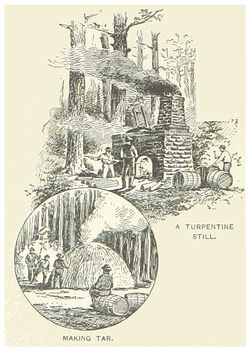Turpentine (nonfiction): Difference between revisions
No edit summary |
No edit summary |
||
| (7 intermediate revisions by the same user not shown) | |||
| Line 1: | Line 1: | ||
'''Turpentine''' (also called '''spirit of turpentine''', '''oil of turpentine''', '''wood turpentine''' and colloquially '''turps''') is a fluid obtained by the distillation of resin obtained from live trees, mainly pines. | [[File:Turpentine-still-making-tar-and-turpentine-1891.jpg|250px|thumb|]]'''Turpentine''' (also called '''spirit of turpentine''', '''oil of turpentine''', '''wood turpentine''' and colloquially '''turps''') is a fluid obtained by the distillation of resin obtained from live trees, mainly pines. | ||
It is mainly used as a [[solvent (nonfiction)]] and as a source of materials for organic synthesis. | It is mainly used as a [[solvent (nonfiction)]] and as a source of materials for organic synthesis. | ||
| Line 7: | Line 5: | ||
Turpentine is composed of terpenes, mainly the monoterpenes alpha-pinene and beta-pinene with lesser amounts of carene, camphene, dipentene, and terpinolene. | Turpentine is composed of terpenes, mainly the monoterpenes alpha-pinene and beta-pinene with lesser amounts of carene, camphene, dipentene, and terpinolene. | ||
The word ''turpentine'' derives (via French and Latin) from the Greek word τερεβινθίνη ''terebinthine'', the name of a species of tree, the | The word ''turpentine'' derives (via French and Latin) from the Greek word τερεβινθίνη ''terebinthine'', the name of a species of tree, the terebinth tree. | ||
Mineral turpentine or other petroleum distillates are used to replace turpentine, but they are very different chemically. | Mineral turpentine or other petroleum distillates are used to replace turpentine, but they are very different chemically. | ||
== | == In the News == | ||
<gallery mode="traditional"> | |||
File:PostcardTurpentineWorkers1912.jpg|link=Turpentine|[[Turpentine]] workers (1912). | |||
File:Brer_Rabbit_and_Tar_Baby_9000_small.png|[[Tar-Baby 9000]] uploads [[Turpentine delight]] into Brer Rabbit. | |||
</gallery> | |||
== Fiction cross-reference == | == Fiction cross-reference == | ||
* [[Tar-Baby]] | * [[Tar-Baby]] | ||
* [[Tar-Baby 9000]] | * [[Tar-Baby 9000]] | ||
| Line 25: | Line 23: | ||
* [[Turpentine delight]] | * [[Turpentine delight]] | ||
== External links | == Nonfiction cross-reference == | ||
* [[Tar (nonfiction)]] | |||
* [[Tar-Baby (nonfiction)]] | |||
External links: | |||
* [https://en.wikipedia.org/wiki/Turpentine Turpentine] @ Wikipedia | * [https://en.wikipedia.org/wiki/Turpentine Turpentine] @ Wikipedia | ||
| Line 31: | Line 34: | ||
[[Category:Nonfiction (nonfiction)]] | [[Category:Nonfiction (nonfiction)]] | ||
[[Category:Materials (nonfiction)]] | [[Category:Materials (nonfiction)]] | ||
[[Category:Organic chemistry (nonfiction)]] | |||
Latest revision as of 15:11, 22 June 2016
Turpentine (also called spirit of turpentine, oil of turpentine, wood turpentine and colloquially turps) is a fluid obtained by the distillation of resin obtained from live trees, mainly pines.
It is mainly used as a solvent (nonfiction) and as a source of materials for organic synthesis.
Turpentine is composed of terpenes, mainly the monoterpenes alpha-pinene and beta-pinene with lesser amounts of carene, camphene, dipentene, and terpinolene.
The word turpentine derives (via French and Latin) from the Greek word τερεβινθίνη terebinthine, the name of a species of tree, the terebinth tree.
Mineral turpentine or other petroleum distillates are used to replace turpentine, but they are very different chemically.
In the News
Turpentine workers (1912).
Tar-Baby 9000 uploads Turpentine delight into Brer Rabbit.
Fiction cross-reference
Nonfiction cross-reference
External links:
- Turpentine @ Wikipedia


